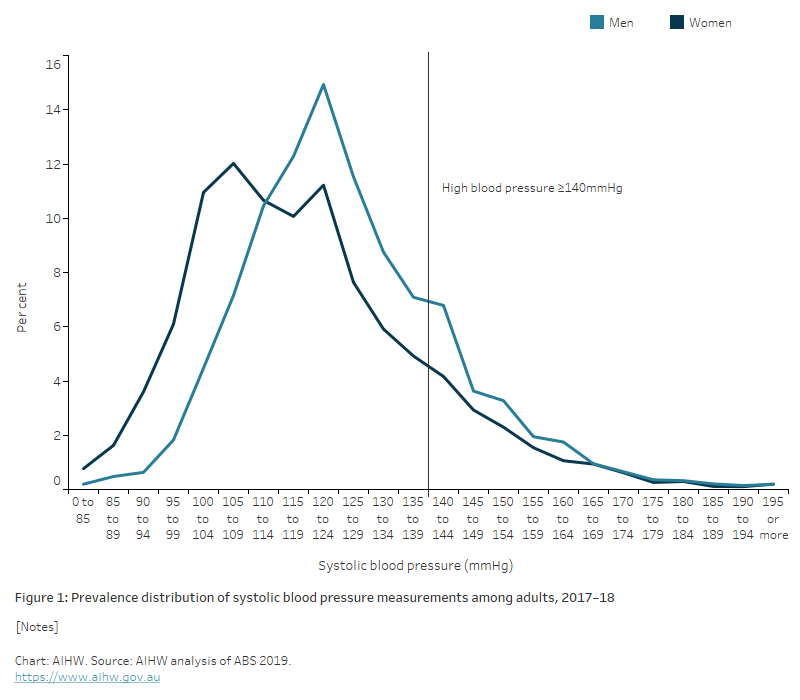High blood pressure
Blood pressure is the force exerted by blood on the walls of the arteries, depending on whether the heart muscle is contracting (systolic blood pressure), or relaxing between contractions (diastolic blood pressure). High blood pressure, also known as raised blood pressure or hypertension, is where blood pressure is permanently higher than normal.
Untreated high blood pressure is a key risk factor for the development and progression of chronic kidney disease. It can damage the blood vessels in the kidneys, leading to reduced blood supply and making waste and fluid removal difficult (Webster et al. 2017). Extra fluid can, in turn, raise blood pressure and cause more damage, ultimately leading to kidney failure.
High blood pressure is also a risk factor for cardiovascular events in people with chronic kidney disease or kidney failure. Drug treatment and changes to health-related behaviours (such as weight loss, a healthy diet and physical activity) can help to control blood pressure.
In the ABS National Health Survey 2017–18, people aged 18 years and over could consent to having a blood pressure measurement taken at the time of the interview. ‘Uncontrolled high blood pressure’ is reported for participants with a systolic blood pressure reading 140 mmHg or more, or diastolic blood pressure of 90 mmHg or more, or receiving medication for high blood pressure (ABS 2018).
Blood pressure is considered to be uncontrolled if measured levels of systolic or diastolic blood pressure are high, regardless of the use of blood pressure medication. ‘Controlled blood pressure’ refers to those people who are taking blood pressure medication and have a normal blood pressure reading.
In 2017–18, based on measured data from the National Health Survey:
- 34% of adults had high blood pressure. This included 23% who had uncontrolled high blood pressure, and 11% whose blood pressure was controlled with medication.
- men were more likely to have uncontrolled high blood pressure than women (25% and 20%) (Figure 1).
- the proportion of adults with uncontrolled high blood pressure increased with age – from 7.5% among those aged 18–34 (10.2% men, 4.9% women) to a peak of 47% at age 85 and over (51% men, 48% women) (AIHW 2019).
The proportion of Australian adults with high blood pressure has been stable since 2011–12.
Figure 1 and 1(b): Prevalence distribution of systolic and diastolic blood pressure measurements among adults, 2017–18
The two line charts show the distribution of systolic and diastolic blood pressure levels among adults by sex in 2017–18.

Variation between population groups
- In 2018–19, of the estimated 486,300 Indigenous adults who had their blood pressure measured, 23% (112,100) had high blood pressure. After adjusting for different population age structures, Indigenous adults were 1.2 times as likely as non-Indigenous adults to have measured high blood pressure (AIHW and NIAA 2022).
- The age-standardised prevalence rate of uncontrolled high blood pressure in 2017–18 was 1.3 times as high among those living in the lowest socioeconomic areas as among those living in the highest socioeconomic areas (AIHW 2019).
- The age-standardised prevalence rate of uncontrolled high blood pressure in 2017–18 was similar between remoteness areas in 2017–18 (AIHW 2019).
ABS (Australian Bureau of Statistics) 2018, National Health Survey: first results methodology, ABS, Australian Government, accessed 1 February 2022.
ABS (2019) Microdata: National Health Survey, 2017–18, AIHW analysis of detailed microdata, accessed 20 March 2019.
AIHW (Australian Institute of Health and Welfare) (2019) High blood pressure, AIHW, Australian Government, accessed 1 February 2022.
AIHW and NIAA (National Indigenous Australians Agency) (2022) Aboriginal and Torres Strait Islander Health Performance Framework summary report 2020, Measure 1.07 – High blood pressure, AIHW, Australian Government, accessed 31 May 2022.
Webster AC, Nagler EV, Morton RL and Masson P (2017) Chronic kidney disease, Lancet, 389:1238–1252, doi: 10.1016/S0140-6736(16)32064-5.


